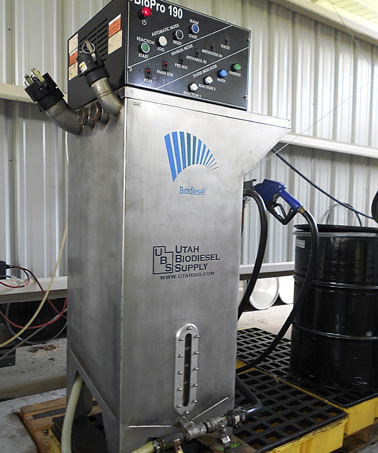County to resume biodiesel production
Alachua County is set to resume producing biodiesel from discarded cooking oil waste to power emergency generators and county vehicles.
ALACHUA COUNTY – Cooking oil used to fry somebody’s lunch on one day could end up in a county-owned car the next.
Governor Rick Scott signed a bill on June 7 that eliminates some of the paperwork local governments must do in order to produce biodiesel fuel.
Under the old law, Alachua County had to be licensed as a fuel wholesaler in order to produce even small amounts of biodiesel fuel solely for internal use.
As a fuel wholesaler, the county had to file taxes that it is exempt from, only to file for a refund later, said Mark Sexton, county spokesman. In addition, the county was required to keep record of and report its inventory of biodiesel to the state.
"The paperwork was really designed for big oil companies," said Chris Bird, director of the Alachua County Environmental Protection Department.
The new bill exempts local governments and school districts from the fuel wholesaler requirements so long as they only produce for internal use.
Alachua County makes fuel from discarded cooking oil waste that local residents and businesses offload to one of the several collection centers the county has set up.
The county suspended biodiesel production last year, said John Mousa, Environmental Programs Manager at the Alachua County Environmental Protection Department. The paperwork required and the manpower Alachua County had to spend was too burdensome, he said.
The new law exempts local governments and school districts from the fuel wholesaler requirement if they produce small quantities for internal use only.
Local restaurants and businesses can drop used cooking oil waste at one of the local waste management stations, where it will be taken to the Alachua County Hazardous Waste Collection Center to be converted to fuel. The county already collects cooking oil waste from residents and businesses since it can clog drains and impact the sewer system, said Bird. The biodiesel is an added benefit that can be used to power generators in case of an emergency, as well as powering county vehicles to cut down on how much fuel it needs to buy. By making the vegetable oil waste into biodiesel, the county also avoids paying a waste disposal fee.
Because the process requires minimal manpower, and people are already providing the main ingredient for free, the cost is much smaller than buying regular diesel Mousa said.
Making a gallon of fuel from vegetable oil waste costs the county about $2 per gallon, while buying a gallon of regular diesel costs about $3 per gallon. Mousa said. Unlike diesel prices, which fluctuate, the cost of making biodiesel remains relatively steady, he said. No additional manpower is used to collect the discarded oil. "It comes to us," he said. In the months before the county suspended production, Mousa said the county was making about 150-200 gallons per month.
"For every gallon of biodiesel we produce, that's one less we have to buy," said Alachua spokesman Sexton. "It's a win-win," he added, noting that the bill will save the county money, give it some degree of energy independence and help prevent waste cooking oil from clogging up drains.
A single machine at the Hazardous Waste Collection Center converts the waste into fuel. Mike Keim, environmental specialist at the Hazardous Waste Collection Center estimated that making 50 gallons of biodiesel requires 50 gallons of waste vegetable oil, 50 gallons of water, about 10 gallons of methanol and around 2,300 grams of potassium hydroxide as a catalyst.
There was little to no opposition to the bill, said state Rep. Keith Perry, R-Gainesville. It passed through each committee unanimously and had widespread support, Sexton added. The county worked with the Florida Department of Revenue to ensure that the bill would not decrease the money the state collects from Alachua County. It only reduces the paperwork and extra bureaucratic steps, Sexton said.
In addition to Perry, state Sen. Rob Bradley, R-Fleming Island and state Rep. Clovis Watson Jr., D-Alachua supported the bill.
"The paperwork was so onerous," Perry said, "it just made it not worthwhile" for the county to continue making fuel. He said this bill has no subsidies, but lets the rules of the economy prevail. If the county is successful in making biodiesel, he hopes private companies will follow suit and new technology will come as a result.
The county expects biodiesel production to resume July 15, Bird said. There will be a sort of reopening ceremony at the Hazardous Waste Collection Center to commemorate the occasion. The county plans to invest in a public education campaign to get more people to drop off household waste such as used vegetable oil.
# # #
Email CMcKinney@
alachuatoday.com
From the fryer to fuel
Tools
Typography
- Font Size
- Default
- Reading Mode


